Holiday weekend hours
It’s another holiday! The law library will be on shorter hours this weekend.
Here are the library hours for this weekend:
- Friday and Saturday, April 6th & 7th: 9 AM to 5 PM
- Sunday, April 8th: Noon to 10 PM
It’s another holiday! The law library will be on shorter hours this weekend.
Here are the library hours for this weekend:
National Library Week is held every April, it is the perfect time to celebrate and explore your library. This year it will be held 4/8 – 4/14, and we encourage you to visit the Law Library during this time. Investigate all that it has to offer the busy, overworked and overwhelmed law student. We hope you will help us celebrate National Library Week, not only by visiting the law library but by participating in the contests we have planned. The contests will run concurrently, please see below for details.
The first contest: “Like us” on Facebook and you could win a prize!
Follow the above link and “like us” that’s all there is to it. By liking the Widener Law –Delaware Library Facebook page you will be entered into a drawing to win a $10 gift card to the Widener Law Bookstore (Delaware Campus). The contest will run from Monday 4/9 to Friday 4/13 (until 12 noon) and is open to Widener students on the Delaware Campus. We will draw the name at 2 pm on Friday, 4/13 and announce the winner on the Facebook page. The winner must come into the library to pick up their prize. Don’t worry if you’re a Delaware Widener student and you’ve already “liked us” those names will be included in the drawing!
The second contest: Facebook Scavenger Hunt (kind of)
Each day (Monday 4/9 – Thursday 4/12) we will announce a clue on our Facebook page. All you have to do is come into the library and check the location given in the clue (it’s going to be easy!). The first five people (you will only be able to win one time) to find the “golden ticket” (replaced at random during reference hours 9am to 9pm) each day win! If you’re the lucky winner – bring the “golden ticket” to the reference librarian to claim your prize. Be on the lookout starting Monday, April 9th for a clue to lead you to a “tasteful” treat. We will announce on Facebook and place a sign at the reference desk each day when the last “golden ticket” of that day has been redeemed.
This contest is open to the Delaware Widener Law Community, however you must be able to come into the library, collect the “ticket” and claim the prize in order to win (Legal Information Center Staff are ineligible to win).
Many of the portraits hanging in the law library are of former Deans or local judges and let’s face it, sometimes they do start to look alike. But if you’ve ever thought that there are two different portraits of the same person hanging in the library, you are not imagining things. But why does the law library have two portraits of Dean Weeks?
Arthur Weeks was Widener’s second Dean. Serving from 1974 to 1980, he was responsible for Widener Law’s successful accreditation by the ABA. In recognition of his service, the first graduating class commissioned a portrait of him in 1980. The portrait was done by artist Diane Keller. Unfortunately, it did not prove to be a popular success. Weeks was posed in front of a colorful oriental rug and students started referring to it as the “shower curtain portrait.” At one point it was stolen as a student prank.
So a second portrait was commissioned, this one by Edward Lis. The second portrait was hung at the law school and the first was quietly forgotten. No one was certain what had happened to it until one of our librarians discovered that Arthur Weeks had it in his home. Dean Weeks and his wife donated the portrait back to the law school and now both portraits hang proudly in the law library.
You can see more of Diane Keller’s work at her website and on the streets of Philadelphia where she has painted several of the city’s famous murals, including Italian-American icons Frank Sinatra, Frank Rizzo, and Mario Lanza.
Edward Lis died in December 2011. He painted portraits of many prominent people in the Philadelphia area as well as landscapes and taught at the Norristown Art League. You can see several of his portraits of Polish–Americans on the Poles in America Foundation’s website.
In a previous post, I covered the role of Delaware women in the struggle to ratify the 19th Amendment to the Constitution, granting women the right to vote. Women from Delaware also played an important part in the long and difficult struggle to get the amendment proposed and passed by Congress. The National Woman’s Party, founded in 1916, was a women’s rights group that used more militant tactics to get the attention of politicians and the public.
One of the leaders of the NWP was Delawarean Mabel Vernon. Born in Wilmington in 1883, her father was a newspaper editor. She attended Swarthmore College, where she met Alice Paul, who would become the leader of the NWP. After college Vernon worked as a teacher until Paul asked her to work as an organizer for the Congressional Union for Woman Suffrage and NWP. She organized local protests and nationwide tours and became an accomplished speaker. In 1916 she led a group of activists who unfurled a banner and heckled President Wilson during a speech to Congress.
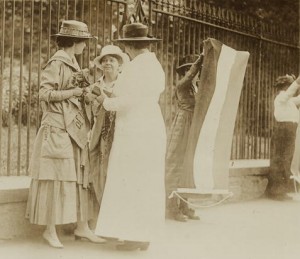
A policewoman (in white) arrests Delawarean Annie Arniel (center left) for picketing the White House
In 1917, the NWP decided to step up pressure on President Wilson and organized pickets in front of the White House. Calling themselves “silent sentinels” the women picketed the White House, in Lafayette Park and at other government buildings. In June 1917 the police began arresting picketers. Initially they were usually released without charge, but when the protests continued the penalties became more serious. Alice Paul and other women were sentenced to up to 6 months in Occoquan Workhouse. Some prisoners held hunger strikes and were force-fed by prison authorities. Released prisoners were sent on nationwide tours by the NWP and spoke to crowds wearing their prison uniforms.
A number of Delaware women were among the protesters. Seven served jail time: Mabel Vernon, Florence Bayard Hilles, Annie J. Magee, Naomi Barrett, Annie Arniel, Catherine Boyle, and Mary Brown. Annie Arniel of Wilmington, who had worked in a munitions factory, spent the most time in jail. She was arrested 8 times and spent a total of 103 days in jail. After one of her arrests Arniel told the Sunday Star, a Wilmington paper, “We were good enough to work in the steel plant and help load shells for the battle-fields of France, but we are still not good enough to vote, it seems. Can anyone see justice in this?”
The National Woman’s Party continued the protests until 1919 when Congress passed the 19th Amendment.
Photo credits: Photographs from the Records of the National Woman’s Party. Library of Congress and Library of Congress, Prints and Photographs Division.
For more information see:
Annie L. Arniel, the Iron-Jawed Suffragette. Webpage by Ken Menard. http://www.angelfire.com/space/kingstonroots/Menard/AnnieArniel.html
Ford, Linda G. Iron-Jawed Angels: The Suffrage Militancy of the National Woman’s Party, 1912-1920. University Press of America, 1991.
Mabel Vernon: Speaker for Suffrage and Petitioner for Peace. Interview by Amelia R. Fry. Bancroft Library. Suffragists Oral History Project.
Stevens, Doris. Jailed for Freedom. Boni and Liveright, 1920.
The Suffrage Movement in Delaware. Historical Society of Delaware http://www.hsd.org/Women_SuffrageMainPage.htm
Women of Protest: Photographs from the Records of the National Woman’s Party. Library of Congress. http://memory.loc.gov/ammem/collections/suffrage/nwp/index.html
After years of struggle by women’s movement advocates to gain the vote for women, the United States Congress passed the 19th Amendment granting women the right to vote in 1919. However, the amendment would not become part of the Constitution until it had been ratified by 36 states. Ten months later 35 states had ratified the amendment and only one more state was needed. The leaders of the women’s suffrage movement looked to the Delaware General Assembly to cast the decisive vote at a special session in March 1920.
The suffrage and anti-suffrage forces descended on Dover to encourage the General Assembly to vote their way, marching through town wearing distinctive flowers, yellow for the suffragists and red for the anti-suffragists. Both sides were led by charismatic women.
The leaders of the suffrage forces were Florence Bayard Hilles of the National Woman’s Party and Mabel Lloyd Ridgely of the Delaware Equal Suffrage Association. Florence Bayard Hilles was the daughter of the American ambassador to Great Britain and was descended from Delaware’s politically prominent Bayard family. Mabel Lloyd Ridgely was the leader of the Kent County suffragists and also came from a prominent Delaware family.
The anti-suffrage leaders were two equally prominent Delaware women. Mary Wilson Thompson was active in many civic causes and was an expert lobbyist. She was eventually known in Delaware for, among other things, founding the Delaware Mosquito Control Corp which worked to reduce mosquitoes in Sussex County. Emily Bissell was a social reformer who founded what is today West End Neighborhood House and is best known for introducing Christmas Seals to America.
Both sides lobbied and protested in Dover. The suffragists brought Eamon de Valera, president of the Irish Free State to Delaware to convince Irish-American representatives and at one point resorted to kidnapping the chairman of a House committee so that he couldn’t present the amendment for a vote the suffragists were sure to lose.
On May 5th the Delaware Senate ratified the amendment. Only the House remained to be convinced. After months of lobbying and rallying by both sides the Delaware House on June 2nd voted to adjourn without passing the amendment. The anti-suffragists had won.
But their victory was short-lived. Delaware had lost its chance to make history and the lobbying and marching passed to the next state, Tennessee, which ratified the amendment by one vote. The Nineteenth Amendment and votes for women became part of the Constitution.
Photo sources:
Florence Bayard Hilles. Photographs from the Records of the National Woman’s Party. Library of Congress.
Mary Wilson Thompson. Historical Society of Delaware.
For more information see:
de Vou, Mary R., “The Woman Suffrage Movement in Delaware,” in H. Clay Reed, ed., Delaware: A History of the First State (New York: 1947), 1:349-70
“Delaware,” in Ida Husted Harper, ed., The History of Woman Suffrage (National American Woman Suffrage Association: 1922) 6: 86-103
Higgins, Anthony, ed., “Mary Wilson Thompson Memoir,” Delaware History 18 (1978-79): 43-62, 126-152, 194-218, 238-266.
Hoffecker, Carol E., “Delaware’s Woman Suffrage Campaign,” Delaware History 20 (1982-83): 149-167.
The Suffrage Movement in Delaware. Historical Society of Delaware. http://www.hsd.org/Women_SuffrageMainPage.htm
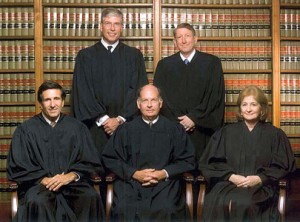 The Delaware Supreme Court will hold oral arguments at Widener on March 21, 2012. Don’t miss this opportunity to see the court in action.
The Delaware Supreme Court will hold oral arguments at Widener on March 21, 2012. Don’t miss this opportunity to see the court in action.
The Court will hear arguments in three cases. Briefs for each case are available on Westlaw so you can read them in preparation.
Delaware law firm Morris James has created Delaware Courts Online, a guide to Delaware’s business courts, including the United States District Court for the District of Delaware, the Delaware Court of Chancery, and the Delaware Superior Court’s Complex Commercial Litigation Division. The website is intended for the firm’s clients and attorneys but will be very useful for anyone who needs more information on the Delaware Courts. It includes court forms and rules, practice tips, descriptions of available court technology, pictures of the courtrooms, and even advice on getting to the courthouse.
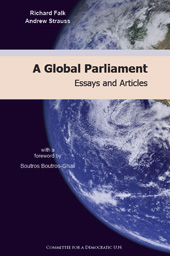 A new book by Widener’s Andrew Strauss is now available in the library. Towards a Global Parliament: Essays and Articles, published by the Committee for a Democratic U.N. reprints articles by Prof. Strauss and Prof. Richard Falk.
A new book by Widener’s Andrew Strauss is now available in the library. Towards a Global Parliament: Essays and Articles, published by the Committee for a Democratic U.N. reprints articles by Prof. Strauss and Prof. Richard Falk.
This ordinary mid-century parking garage once played an important part in the struggle to end segregation in Delaware. In 1958, William H. Burton, an African American and member of the Wilmington City Council, entered the Eagle Coffee Shoppe, a restaurant on the ground floor of the parking garage and was refused service. The restaurant, like most restaurants and theaters in Wilmington at that time would not serve African Americans. The parking garage was built and maintained by the Wilmington Parking Authority, which had leased space to shops and a restaurant in order to defray the cost of the garage. Burton, represented by Louis L. Redding, filed suit in the Delaware Court of Chancery against the restaurant and Parking Authority. The case was eventually appealed to the United States Supreme Court which found in Burton v. Wilmington Parking Authority 365 US 715 (1961) that because the restaurant was in a government owned building, refusing service to Burton on the basis of his race violated the Equal Protection Clause of the Fourteenth Amendment.
In a 1998 interview, attorney Frank H. Hollis remembered how the case started. Seven African-American Chrysler workers had been arrested and charged with trespassing for trying to eat in the Eagle Coffee Shoppe. Hollis represented the seven. After conferring with Louis Redding and the NAACP, councilman Burton was asked to be a test case. When Burton was also denied service, Redding filed the suit against the Wilmington Parking Authority and the restaurant.
Burton’s attorney Louis L. Redding, was the first African American attorney in Delaware. He had a long legal career in Delaware and argued many important civil rights cases. Besides Burton v. Wilmington Parking Authority he was also the attorney for the plaintiffs in Gebhart v. Belton which eventually was heard as part of Brown v. Board of Education of Topeka, 347 U.S. 483 (1954).
The parking garage is now closed, though it still stands at the corner of 9th and Shipley. The Eagle Coffee Shoppe has been gone for many years and is currently the location of the Ninth Street Book Shop.
UPDATE: The Midtown Parking Center was demolished in 2013 to be replaced by an apartment complex.
Sources:
Frank H. Hollis. My Memories of Law Practice in Wilmington, Delaware. Del. Law., SUMMER 1998, at 22
Carolyn D. Mack. The Other Side of Equity: The Court of Chancery and Civil Rights. 5 Del. Law. FALL 1986 at 20 (1986)
Harvey Bernard Rubenstein. Delaware Controversies That Have Shaped the Constitution. 6 Del. Law. 122 (1987-1988)
Robert E. Whiteside. Parking Facilities Developed in Merchant-City Programs. 13 Traffic Quarterly 294 (1959)
and thanks to Jack Buckley, Ninth Street Book Shop
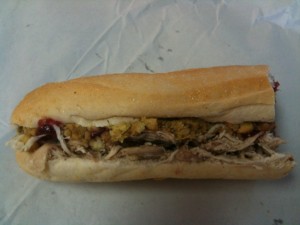 The News Journal reports that local sub chain Capriotti’s has sued it’s Las Vegas franchise, accusing it of breaching the franchise agreement by offering Bobbie sandwich happy hour specials at the Crazy Horse III gentlemen’s club. (Here I considered linking to the club’s website. But that would end badly and I’d wind up on Above the Law. So google it yourself and instead I’ll give you this description of the special at Las Vegas Weekly.)
The News Journal reports that local sub chain Capriotti’s has sued it’s Las Vegas franchise, accusing it of breaching the franchise agreement by offering Bobbie sandwich happy hour specials at the Crazy Horse III gentlemen’s club. (Here I considered linking to the club’s website. But that would end badly and I’d wind up on Above the Law. So google it yourself and instead I’ll give you this description of the special at Las Vegas Weekly.)
Read the complaint, which was filed in the Delaware Court of Chancery on January 17th for all the legal arguments. Because I’m too hungry to go on. To tell the truth I’m more of a Casapulla’s fan. Or you should really check out Gaudiello’s on the back side of Trolley Square. They have great Italian hoagies.
Photo by: nealdstewart/flickr
Here’s an interesting brief video on the life of Mary Ann Shadd Cary, African-American educator, journalist and lawyer who was born in Delaware.
The Library of Congress has just released an iPad app that brings each day’s Congressional Record to your iPad. Each issue is a PDF file that you can email and share with other people. The new app is available from the iTunes store.
The Widener Law library Delaware campus is now on Facebook. Visit our Facebook page and “Like” us to keep up with news and events at the library.
The Harrisburg campus library has a Facebook page too so why not Like them too.
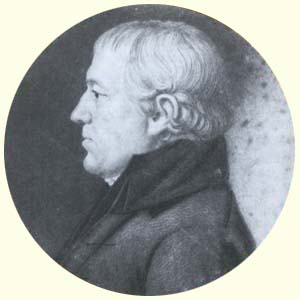 I’ve reached the end of my short series of local legal historic sites associated with Delaware’s signers of the Constitution. Previously we’ve covered Gunning Bedford Jr., Jacob Broom, George Read, and John Dickinson. Our final Delaware signer is Richard Bassett. One of the biggest difficulties in writing this profile is coming up with a physical historic site related to Bassett. Bassett was once one of the richest men in Delaware, owning estates in Maryland and Delaware and a house in Wilmington. None of these houses remain. The only remaining site is his burial place, in the Bayard-Bassett vault in the Wilmington and Brandywine Cemetery.
I’ve reached the end of my short series of local legal historic sites associated with Delaware’s signers of the Constitution. Previously we’ve covered Gunning Bedford Jr., Jacob Broom, George Read, and John Dickinson. Our final Delaware signer is Richard Bassett. One of the biggest difficulties in writing this profile is coming up with a physical historic site related to Bassett. Bassett was once one of the richest men in Delaware, owning estates in Maryland and Delaware and a house in Wilmington. None of these houses remain. The only remaining site is his burial place, in the Bayard-Bassett vault in the Wilmington and Brandywine Cemetery.
Richard Bassett was born in Bohemia Ferry in Cecil County Maryland. His parents ran the Bohemia Ferry Tavern. Bassett’s father left his family. Luckily for Bassett his mother was an heir to Bohemia Manor, a huge estate in Cecil County. Bassett was adopted by Peter Lawson, a lawyer, who was also an heir to Bohemia Manor, which Bassett eventually inherited. Lawson trained his adopted son as a lawyer. Bassett became a member of the Delaware Bar in 1770 and began his practice in Dover, Delaware.
During and after the Revolution, Bassett served at the Delaware State constitutional convention and was a member of the state Legislative Council and House of Assembly and the captain of a troop of cavalry. In 1787 he was chosen as a member of Delaware’s delegation to the Constitutional Convention. He never spoke at the convention but voted in favor of the new Constitution.
He was elected to the United States Senate in 1788 where he supported a strong judiciary. He was governor of Delaware in 1798, resigning in 1801 when he was named a judge of the Third Circuit by John Adams. He was one of the “midnight judges” whose position was eliminated in 1802 by the repeal of the Judiciary Act of 1801 by the new administration of Thomas Jefferson. Bassett published a pamphlet arguing against the elimination of the judges and in favor of judicial independence.
Besides his political and legal activities Bassett was also a strong supporter of the Methodist Church. He converted to Methodism in the 1780s and supported Francis Asbury and other Methodist ministers. He invited Methodist preachers to Bohemia Manor and held camp meetings there. His religious scruples led him to oppose slavery, freeing his own slaves and trying to convince Delaware to abolish slavery.
Bassett was married twice. He had no sons, but one of his daughters, Ann, married James A. Bayard, who became a U.S. Senator for Delaware and founded a dynasty of Delaware Senators including Richard H. Bayard, James A. Bayard, Jr., Thomas F. Bayard, Sr. and Thomas F. Bayard, Jr. Bassett died in 1815 at Bohemia Manor.
Photo credit: Engraving, by Charles B. J. Fevret de Saint-Memin (1802). From Wikimedia
For more information on Richard Bassett see:
Robert E. Pattison. “The Life and Character of Richard Bassett.” Papers of the Historical Society of Delaware (1900)
Gaspare J. Saladino. Bassett, Richard. American National Biography. Oxford University Press, 1999, v. 2
The Delaware campus law library is open again. I hope everyone enjoyed their holidays and time off.
Here are our hours for the remainder of the winter class break
For our complete hours see our library webpage.